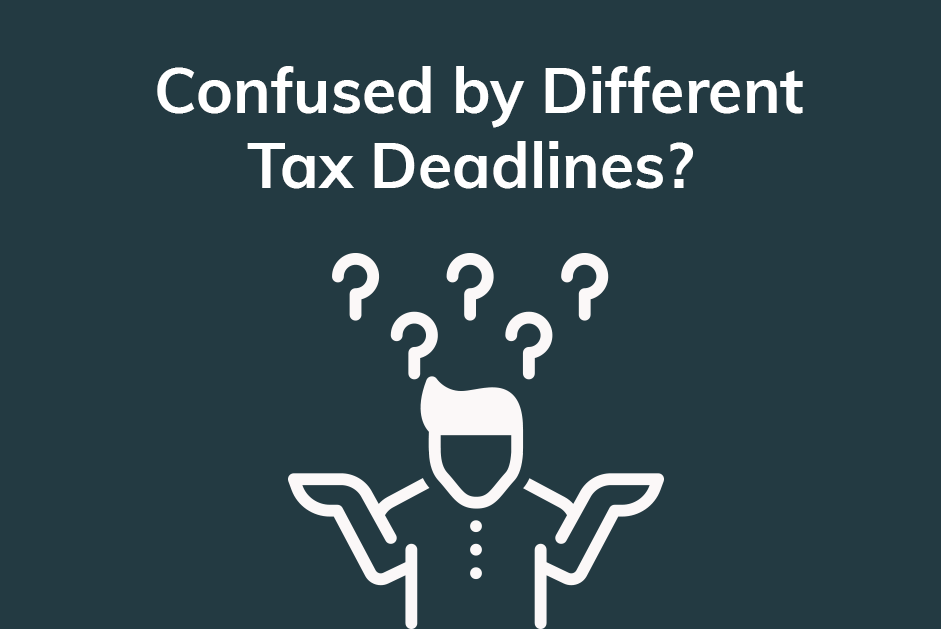As April moves in and on, heralding a new tax year, there’s an almost audible sigh of relief from tax accountants across the land, at the end of a very deadline-heavy three months.
But it can be dangerously complacent to think that’s all your tax deadlines out of the way. To avoid nasty surprises, last-minute panic, and even punitive action, here’s our down-to-earth Q&A guide to different tax periods.

What is the UK tax year?
The tax year runs from 6th April to 5th April the following year and is the period upon which individuals’ income is assessed and reported to HM Revenue and Customs (HMRC).
What deadlines are relevant to me?
The deadline for filing self-assessment tax returns and paying any outstanding liability is 31st January following the 5th April end of the tax year. Businesses also calculate and report their tax liability to HMRC during the tax year, but their deadlines vary, more details on that later.
April 6th seems an odd date to start any kind of New Year?
In short: yes.
So why does the tax year start then, not January 1st?
Historically, New Year in England began on Lady Day, which fell on March 25th, so financial deadlines were always geared to March 24th, not December 31st. We also followed the Julian calendar, putting us 11 days behind the rest of Europe, which adopted the Gregorian calendar, introduced by Pope Gregory, in 1582. With increasing overseas trade, in 1782, the British government made the sensible decision to align with the rest of Europe, so September that year went straight from the 2nd to the 14th (it also sparked riots, as the government insisted on collecting tax for 365 days, whereas businesses argued there had only been 354 days’ trading!).
This put the start of the financial year to April 5th until a complication with an 1800 leap year clash resulted in it being pushed back a day further: April 6th.
Is this the only annual tax deadline?
While the while the tax year is set and standardised by the government for tax purposes, the financial year for limited companies usually varies, depending on trading start date, or when registered with Companies House. Your financial (or fiscal) year is the period during which your company calculates its financial performance and prepares its financial statements. While it is possible to align a company’s financial year with the tax year, it is not a requirement, with most businesses avoiding the initial upheaval.
What do I need to do to prepare for financial year-end reporting?
Key limited company information must be sent to HMRC and Companies House. Your company’s Statutory Accounts, containing details of turnover, profit, expenses and tax allowances, must be sent to HMRC on Company Tax Return form (CT600). HMRC use this to levy corporation tax (your accountant may be able to estimate for you).
You also send Statutory Accounts (also known as Annual Accounts) to Companies House. Made up of a summary of income and outgoings, they document the company’s financial activity during the year for the benefit of HMRC and company shareholders. Paperwork includes Income Statement, Statement of Financial Position, Director’s Report, plus any footnotes and additional information.
While technically not part of year-end returning, it makes sense to submit your VAT return (if your company is VAT-registered) and annual Confirmation Statement at the same time; your accountant will be able to roll all these into end of year reporting for you.
When do financial year accounts need to be submitted?
Just as tax year self-assessment must be submitted by 31st January the following year, time is allowed between a company’s financial year-end and filing deadline, generally 9 months after the end of your individual financial year. Company tax returns are filed 12 months later, and new companies have up to 21 months after registration to file their initial accounts.
What are the penalties for late submission?
Submission up to a month late incurs fines of £150, 1-3 months: £375, 3-6 months: £750, and over 6 months: £1,500. Not only is this an unnecessary waste, especially when cashflow is tight, it can create a domino topple of late reporting across subsequent years. Because Limited Company information is public, late reporting does not reflect well on the company, and can cause damage to reputation and trading. Not allowing enough time is one of the most common errors we see, when people turn to accountants for help at the last gasp.
It all seems very complicated?
Correctly produced, annual accounts are an advantageous tool to understand key aspects of your business’s operations and financial health, helping you plan for growth. But when you’ve got day-to-day business to focus on, they can seem an extra complicated pressure. And that’s why we have accountants!
Simon at ICS, says:
“For most businesses, the support provided by an accountant is invaluable, not just ensuring all your filing, paperwork and payments are made on time. Estimating tax in advance, for example, enables you to budget for the right amount and not be hit by nasty surprises. Utilising specialists for a one-stop package including tax, accounts, payroll, annual accounts, even debt chasing and stock management can free up your time and headspace to focus on driving and growing your business.”
Discovering Deadline Peace of Mind
With more than 75 years of combined experience, ICS’s understanding tax and self-assessment experts are on your side. Our friendly, dedicated team can help with all your payment and paperwork queries, providing solutions to set you on the path to self-assessment peace of mind.
For no-obligation advice, or to discuss your individual requirements with one of our friendly team simply call 01524 580720, or email info@icsuk.com


















